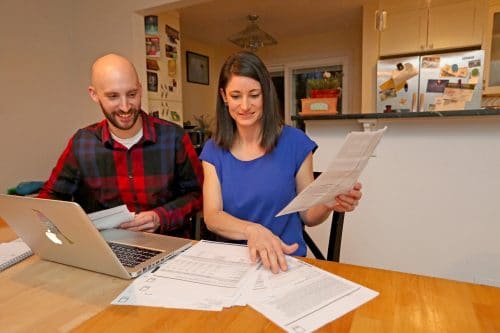American Workers Need A Recovery That Benefits Them. Employee Ownership Can Help Deliver It.
COMMENTARY

Long before COVID-19, Americans were facing a looming crisis of low household savings and unsustainable debt. The economic consequences of the pandemic made matters worse, with unemployment hitting modern highs, consumer debt reaching record levels and many Americans depleting their household savings.
Today, the future looks brighter. But creating a path for working Americans to get their household finances back on track won’t be easy and it won’t happen overnight.
After over a year of layoffs and furloughs, workers everywhere need good jobs and solid wages. Families need to know they can make their rent or mortgage payments and have enough set aside to cover an emergency expense. And Americans who have worked hard for years need to know they can count on a secure retirement.
There is no silver bullet solution to accomplish all of this. But a growing body of research points to policies that encourage employee ownership of private companies – specifically companies owned by an employee stock ownership plan, or ESOP – as an important part of the solution.
The latest example comes from pollster John Zogby, who surveyed a sample of mid- and lower-level employees at employee-owned private companies and compared their financial experience during the pandemic to that of other workers. Zogby “found a world of difference between the two groups,” as workers at employee-owned S corporations (S-ESOPs) reported being on significantly more stable financial ground than those who did not work at employee-owned companies.
The differences between ESOP and non-ESOP workers were so stark that Zogby branded his findings “a tale of two economies,” and it’s easy to see why. During the pandemic, employee-owners said they have experienced dramatically less financial adversity, and have had more stable jobs, better housing security and stronger retirement savings than their non-ESOP counterparts.
The survey found that non-employee-owners experienced job losses or downsizing at six times the rate of their peers working at employee-owned companies. Perhaps this should come as no surprise, as research prior to the pandemic found that job growth among employee-owned S corporations has a long track record of outpacing that of the private sector as a whole.
Similarly, workers at regular companies have been adversely affected by the pandemic economy at more than three times the rate of employees at ESOP companies, while twice as many non-ESOP respondents say they are concerned about their ability to pay down debt. When it comes to emergency savings, three times as many ESOP employees say they are able to cover an emergency $500 expense.
In perhaps the most striking comparison of all, none of the workers at ESOP companies reported being behind on rent or mortgage payments – a potentially catastrophic problem that was, by contrast, reported by an alarming 26% of non-ESOP workers.
And, adding to the evidence that employee-owned firms lead to far stronger long-term optimism among workers, ESOP respondents expect to retire by the age of 60 at a rate more than double that of non-ESOP employees. This tracks closely with earlier research revealing that S-ESOP participants have more than twice the average total retirement balance of the average American.
“Policy-makers would be wise to incentivize the ESOP structure for as many working Americans as possible so that financial strength and independence may be fostered and achieved,” Zogby wrote in reporting his findings. “With a debt crisis looming, the ESOP path may provide a lodestar for weathering such a potential storm.” He’s in good company.
Earlier this year, economist Jared Bernstein, now a member of President Biden’s White House Council of Economic Advisers, authored a study affirming the many benefits of employee ownership and urging policymakers to take steps that encourage the formation of new ESOPs, steps which can be as simple as promoting awareness of the ESOP structure to business owners nearing retirement age. Previous research conducted by Bernstein found that employee ownership can help close the wage and wealth gaps.
In Congress, there has long been significant, bipartisan support for employee ownership. This broad agreement was reiterated recently as Sens. Ben Cardin, D-Md., and Rob Portman, R-Ohio, introduced the Promotion and Expansion of Private Employee Ownership Act and Reps. Ron Kind, D-Wis., and Jason Smith, R-Mo., introduced companion legislation in the U.S. House, providing real cause for optimism.
As Congress works together to grow our economy, create good jobs, and build a foundation for generations of economic security for middle-class Americans, extending the proven, substantial benefits of employee ownership to more Americans should be among their top priorities.
Stephanie Silverman is the president and chief executive officer of the Employee-Owned S Corporations of America (ESCA), which speaks exclusively for employee-owned S corporations (“S ESOPs”). Since 1998, ESCA’s membership has grown to represent more than 215,000 employee-owners in every state in the nation. ESCA company members engage in a broad spectrum of business activities and are a variety of sizes – from 25-person businesses to companies with more than 18,000 employee-owners – but all have one thing in common: a commitment to protecting the S corporation ESOP structure and promoting it so that more working Americans can become employee-owners.























